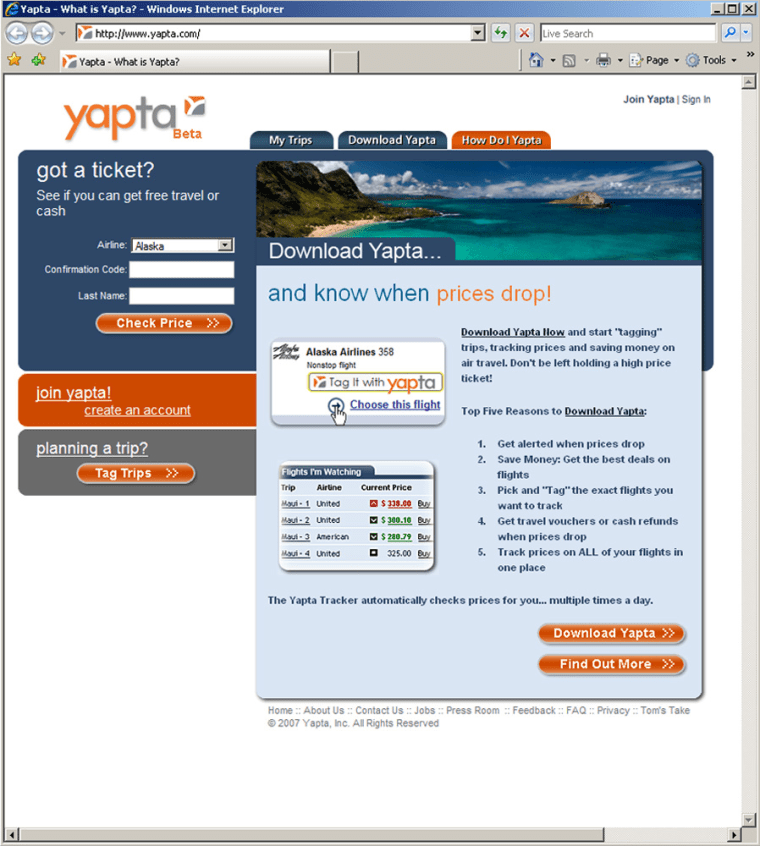Online travel agencies. Proprietary Web sites for every airline, hotel and destination. Blogs, video clips and garrulous gigabytes of user-generated reviews. Sometimes it seems like I spend more time researching travel than actually going anywhere.
Fortunately (and, perhaps, ironically), help may be at hand thanks to the launch of several new Web sites. Currently operating in various states of beta testing, each of the sites below is designed to simplify the search for good deals and/or accurate information. And while none are likely to make TripAdvisor or Travelocity obsolete, they’re filling unique niches and raising interesting possibilities.
What it is: An acronym for “Your Amazing Personal Travel Assistant.” Users can search multiple air-travel sites, “tag” flights they’re interested in and receive alerts and/or credit if the price drops.
How it works: Two ways, actually. Users who download the Yapta Tagger plug-in can tag flights on various online travel agencies (OTAs) and airline Web sites, then monitor them on their My Trips page on Yapta. If a fare drops (in accordance with your pre-set parameters), you’ll receive an e-mail noting the change. If it’s a flight you haven’t purchased yet, it’ll provide a link so you can complete the transaction. If you’ve already bought it, it will include information on any available refunds or vouchers.
Meanwhile, users who don’t want to download the Tagger can input their confirmation code (for select airlines) on the Yapta homepage and find out if a refund or voucher is available.
Why it’s cool: Keeping track of fares that can seesaw several times a day is a nightmare. Once you’ve tagged potential flights, the site not only monitors them, but also alerts you to any price drops. (“Since we began tracking,” says CEO Tom Romary, “the average savings has been $40.”) One caveat: the site doesn’t actually process refunds/credits. You still have to do that yourself.
What’s next: Currently, users can tag flights on the three major OTAs and the Web sites of eight U.S. airlines. The company hopes to add more airlines this summer and will come out of beta, says Romary, “when we have a complete set of domestic airlines, a solid set of international airlines and a tagger that works with Firefox.”
What it is: A hotel review site that combines user-generated content, social networking and meta-search capability.
How it works: Members of the VibeAgent community create personal profiles, form networks of friends and colleagues, and post reviews complete with tags for everything from atmosphere (e.g., hip, historic or stylish) to guest friendliness (e.g., families, honeymooners, business people).
Why it’s cool: When it’s time to find a hotel, the site will cross-reference your preferences with its existing database. Factoring in other users’ reviews and any social-network group you’ve created, it will assign each result a “vibe index” based on your parameters and others’ recommendations. “The more information you put in,” says co-founder and CEO Adam Healey, “the better the recommendations will be.”
Once you’ve selected a hotel, the site then switches into meta-search mode, scouring the Web for the best price through various OTAs and hotel-chain reservation systems. The idea, says Healey, is to provide recommendations you can trust at the best possible prices all on one site.
What’s next: Still in private beta testing, the site is currently open by invitation only. It will move to public beta testing not according to a timeframe, says Healey, but when it reaches a critical mass of reviews.
What it is: A matchmaking service for travel. Travelers, especially those with complex plans, are matched with travel agents who possess the appropriate expertise.
How it works: Users fill out a form on the Tripology Web site, noting where, when and how they’d like to travel. Dates, destinations, favorite airline (or cruise line), even specific tours and activities — it’s all easily inputted via check boxes and drop-down menus.
That information is cross-referenced with the site’s database of nearly 5,000 travel agents, all of whom have provided information on their areas of expertise. The three best matches are then put in touch with the potential customer, who can choose who, if anybody, to work with.
Why it’s cool: Say you want to go on a food tour of Tuscany or a bike trip through Brazil. “It can be hard to find basic information,” says CEO Chinedu Echeruo, “and even harder to find a specialist who knows the territory.” Because Tripology charges travel agents a fee to contact potential customers, only those who really know the subject matter at hand are likely to pursue it. Travelers get access to agents they may never have found on their own (and vice versa).
What’s next: The site is building up its database and adding software that will use customers’ experiences to create a rating system for agents. They hope to come out of beta testing in the fall.
